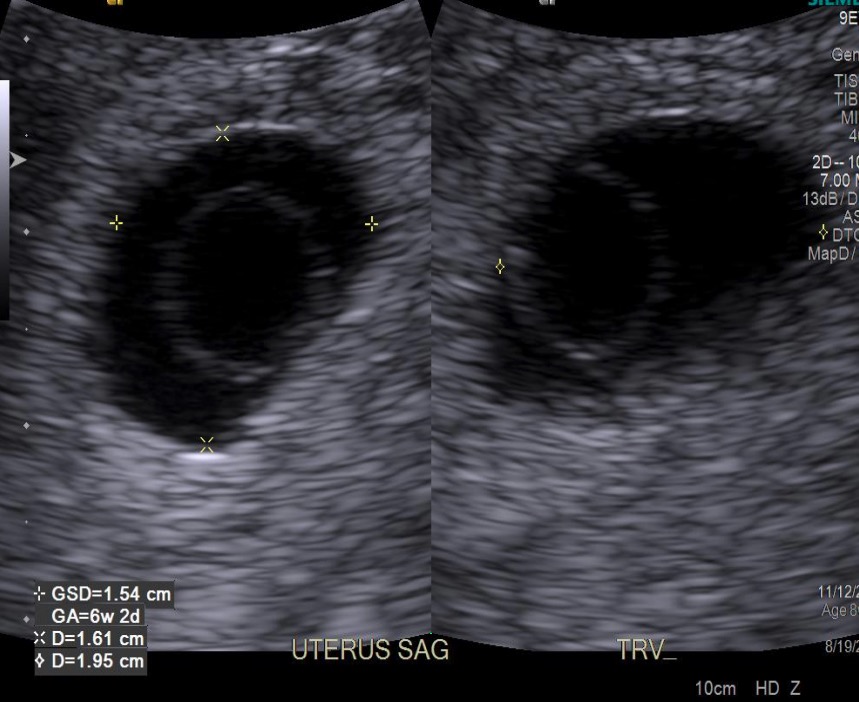Playlist
Show Playlist
Hide Playlist
Hyperemesis Gravidarum
-
Slides HyperemesisGravidarum Obstetrics.pdf
-
Download Lecture Overview
00:01 So now let's discuss Hyperemesis Gravidarum. 00:05 Let's start with a case. 00:08 A 25 year old Gravida 1 Para 0 female at 8 weeks gestation presents to the emergency room with complaint of nausea vomiting. 00:17 She says she is unable to keep anything down. 00:20 She reports a 10 pound weight loss throughout the pregnancy. 00:24 On physical exam she appears dehydrated. 00:27 Vital signs are stable and she is afebrile. 00:30 Her basic metabolism panel shows a potassium of 2.9 and a sodium of 131. 00:36 What is her diagnosis? Let's explore the lecture to find out. 00:41 So hyperemesis gravidarum, what are the signs and symptoms? First, intractable nausea and vomiting. Now it's very common in pregnancy to have nausea and vomiting in the 1st trimester. 00:51 And this usually resolves by 13 weeks. 00:54 However, with hyperemesis gravidarum this is intractable and it usually can continue into the 2nd trimester. 01:01 Patients with hyperemesis gravidarum usually have weight loss that can be anywhere from 5 to 10 pounds all the way up to 15 to 20 pounds. 01:10 They also experience electrolyte disturbance. 01:13 This is usually manifest in a low potassium. 01:15 Sometimes low sodium as well. 01:19 Another symptoms is a hypokalemic, hypochloremic metabolic alkalosis. 01:24 So how do we treat hyperemesis gravidarum? Well the first thing we want to do is IV hydration. 01:30 Now it's very important that this hydration be first with normal saline. 01:35 Why is that? Well, pregnancy is a state that can make you thyamine deficient. 01:40 If you begin to hydrate with something that contains D-5 or some type of a glucose solution, that can worsen the thyamine deficiency. 01:49 And actually lead to something called Wernicke's Encephalopathy. 01:52 The other thing about hydration is you need to make sure it is slow. 01:56 If you hydrate too quickly, you can cause central pontine myelinolysis. 02:00 We want to avoid that. 02:02 So electrolyte disturbances. 02:05 You want to correct those. 02:06 Again pregnancy is a time when thyamine is low. 02:10 It's going to be worse by hyperemesis gravidarum. 02:13 So we want to correct that. 02:15 We also want to correct the other electrolyte disturbances such as a low sodium or low potassium. 02:20 Next we want to treat the nausea vomiting. 02:24 And this is a clinical pearl. 02:26 So we have a lots of options for treating nausea vomiting in pregnancy as well as hyperemesis gravidarum. 02:32 Our first line treatment is vitamin B6 and doxylamine. 02:36 They work synergistically together to help with the nausea vomiting that we see with pregnancy. 02:40 If that's not effective we can move on to our other anti-emetic. 02:44 Let's discuss a few. 02:46 One is ondansetron. 02:48 Ondansetron is a medication that works very well for nausea vomiting. 02:52 However, the side effect is constipation. 02:55 You want to make sure your patients are aware of this, because constipation can be a common problem in pregnancy. 03:01 The next medication is Metoclopramide. 03:04 This medication has a side effect of extrapyramidal movements. 03:08 So you want to make patients aware of that if they start to feel very anxious or weird or start making movements that they feel that they can't control. 03:17 They want to stop taking the medicine. 03:19 Another clinical pearl are those extrapyramidal side effects can be reverse by Benadryl. 03:25 The next medication is Phenergan. 03:27 Phenergan also works very well for nausea vomiting. 03:30 But it has a side effect of sleepiness. 03:33 I should mention that the most recent guidelines recommend avoiding Zofran prior to ten weeks if possible, primarily because of the increased risk of oral clefts and VSD. 03:47 Let's go back to our case. 03:48 Again this is a 25 year old Gravida 1 Para 0 female at 8 weeks gestation that presents to the emergency room complaining of nausea vomiting. 03:58 She states she is unable to keep anything down. 04:00 She has a 10 pound weight loss throughout the pregnancy. 04:04 And on physical exam she appears dehydrated. 04:07 Her vital signs are stable. 04:08 She doesn't have a fever. 04:09 Her basic metabolism panel shows a potassium of 2.9 and a sodium of 131. 04:16 What is her diagnosis? Is it A. Anorexia. 04:20 B. Bulimia C. Hyperemesis Gravidarum or D. Morning sickness. 04:27 Let's think about all the answer choices. 04:30 Anorexia. 04:31 Anorexia manifests a little differently. 04:34 These are patients that are not eating. 04:35 And it really has nothing to do with pregnancy. 04:38 Bulimia, these people with bend eat and then induce vomiting. 04:42 Again unrelated to pregnancy. 04:44 Is Hyperemesis Gravidarum our answer here. 04:48 Let's check out the stem again. 04:50 The patient had a 10 pound weight loss and she has some electrolyte disturbance. 04:55 Her potassium is low as well as her sodium. 04:58 In this case hyperemesis gravidarum is the answer.
About the Lecture
The lecture Hyperemesis Gravidarum by Veronica Gillispie, MD, MAS, FACOG is from the course Antenatal Care. It contains the following chapters:
- Hyperemesis Gravidarum
- Hyperemesis Gravidarum – Treatment
Included Quiz Questions
A patient with hyperemesis gravidarum presents to the hospital showing signs of dehydration, a potassium level of 3.1, and a sodium level of 132. What is the best immediate treatment for this patient?
- Slow infusion of normal saline
- Rapid bolus infusion of normal saline
- Rehydration with oral dextrose solution
- Slow infusion of lactated ringers in 5% dextrose solution
- A bolus of lactated ringers in 5% dextrose solution
Which of the following is the first-line treatment for hyperemesis gravidarum?
- Slow oral or IV hydration
- Ondansetron
- Metoclopramide
- Phenergan
- Midazolam
Which of the following can be a complication when using D5 IV hydration to replete a patient with hyperemesis gravidarum?
- Worsening thiamine (vitamin B1) deficiency
- Polycythemia
- Decreased urine output
- Prerenal acute kidney injury
- Worsening vitamin A toxicity
Customer reviews
5,0 of 5 stars
| 5 Stars |
|
2 |
| 4 Stars |
|
0 |
| 3 Stars |
|
0 |
| 2 Stars |
|
0 |
| 1 Star |
|
0 |
I love her, she's great at explaining. The use of case scenarios make the classes more interesting too.
She is really amazing! I have been learning a lot. Thanks Dra. Veronica Gillispie.




